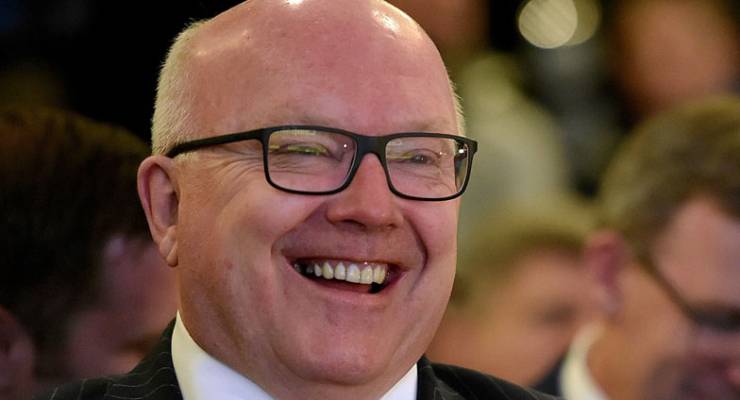
Few saw the Excellence Arts Raid of May 2015 coming. In the wake of the Biennale controversy and the funding cuts of treasurer Joe Hockey’s politically disastrous 2014 budget, anxiety in the cultural sector had abated somewhat. There were no overt warning signs. Brandis appeared content to let the Australia Council get on with the job of restructuring itself along the lines laid down by Gabrielle Trainor and Angus James, co-chairs of the Australia Council review.
The decision handed down in Canberra on budget day in May 2015 astonished everyone with its audacity. Without a hint of warning, Brandis peremptorily moved $105 million of the Australia Council’s funding out of the agency, using it to set up a ministerial slush fund. He gave this the grandiose title of the National Program for Excellence in the Arts. The Australia Council’s chair, Rupert Myer, was called at about 5pm on budget day, just hours before Hockey was due to release the budget papers. The agency’s CEO, Tony Grybowski, cut short a family holiday in Britain and rushed back to Sydney. The sector was gobsmacked. No one was consulted. No one was even told. Brandis simply announced it in a budget night media release. He was the minister, after all.
What allowed Brandis to do this? In a word: power.
[‘Devastating’ OzCo grants just the tip of the iceberg]
Power is a much-abused term. That doesn’t mean it’s not relevant to our examination. So let’s examine political power in Australia, using the example of cultural policy.
Power is a subtle and chameleonic thing. The philosopher Stephen Lukes thinks it is “three-dimensional”. The sociologist Michael Mann thinks it is about “power resources”. Max Weber called power “the chance of a man or of a number of men to realize their own will in a communal action even against the resistance of others”. It is the ability to exert your will on others that the powerful actor enjoys. It is perfectly comprehensible to all those exerting it or subjected to it. The vernacular idea of power as the ability of the powerful to exert dominance over others just about covers it.
And it just so happens that the classic definition of power, by Weber, neatly approaches that idea. Power is the great subject of journalism, and it is not surprising that many journalists default to realist (or quasi-realist) analyses. The journalist is granted the ability and privilege to see the workings of power close up.
These can alternatively fascinate or revolt, but can hardly fail to impress. The apparatus of power, and the means with which it is deployed, remain absorbing subjects of human enquiry.
Of course it’s more than this, because power is also consequential. The decisions of the powerful affect others, making and unmaking social contracts and communal relations. The stroke of the minister’s pen can lead to job losses, companies closing and protests on the street. This sounds melodramatic — until you realise that all of these things have happened in the arts in the past year. I have attended Senate inquiries, witnessed street protests and watched arts ministers dissemble to a media pack. Culture is far more political than its own practitioners realise.
[Catalyst funding blows out by $12m as OzCo applicants sweat]
In contemporary Australian democracy, power is exercised in a number of ways. First and foremost, it is the prerogative of elected governments. The Department of Prime Minister and Cabinet remains the pre-eminent decision-making body in the Australian public service; together with the Finance and Treasury Departments, they make up the so-called ‘central agencies.’ Decisions about policy and money flow down the chain from a very constrained number of individuals — the Prime Minister, his senior advisers, the Treasurer, perhaps a couple of other senior ministers. Full cabinet meetings are supposedly the seat of executive government, but nowadays key decisions are taken before the cabinet even sits. Kevin Rudd was notorious for making peremptory decisions in a “kitchen cabinet” of just four (Rudd, Wayne Swan, Julia Gillard and Lindsay Tanner); Tony Abbott and Peta Credlin were often perceived as a duumvirate.
Decisions from the top flow down to the line departments, responsible for their various ‘silos’: Communications, Defence, Social Services, and eventually the Arts. Money for activities like funding artists is only grudgingly dispensed: the arts are not seen as a serious activity of the Australian Government, but rather a bell-and-whistle, an add-on, a bit of window dressing. The small investment in culture in Australia — around about $650 million in the Arts portfolio, a little more than $2 billion if you include the ABC and SBS — is essentially a rounding error in the
context of a $400 billion federal budget.
* This an extract from Ben Eltham’s new Platform Paper, WHEN THE GOAL POSTS MOVE: Patronage, power and resistance in Australian cultural policy 2013-16, published by Currency House. Eltham, lawyer and 3RRR presenter Michelle Bennett, and independent artist David Pledger will launch the paper at an open event at 6pm on 8 August at Collingwood Arts Precinct. Bookings essential.








Brandis is an awful man, a less than impressive legal eagle (more like a legal goose) and as thick as three short planks.
As governors general go, Brand X.
Pretty poor effort for the Monday edition. This isn’t an article, it’s an ad for something else. An incomplete teaser.
An elegant overview of power and how it is used by government but it doesn’t address the article’s title. I was wanting to read about a scoop on a rationale, perhaps a tippy-top secret agenda for another front of cultural engagement, or a new ediface, or a trade-off for increase access to arts training and facilities, or…. The alternatives, for example those that might arise from opining on his character, taste, and values, are self evident.
I agree, I’m actually in the middle of studying theorists on power for Uni, and thought I could use some nitty gritty details behind the obvious power play manoeuvre, but there was nothing!
Thank you Ben Eltham, for your interesting analysis. I am looking forward to reading your Performance Papers essay. If many Australian artists are not aware that culture is political, they should read about the history of totalitarian regimes, and their treatment of artists: the Soviet Russians, for example, and theur treatment of artists such as Dmitri Shostakovich, or Anna Akhmatova: or the Nazis, and their treatment of artists like Stefan Zweig, or Erich Korngold. Oppressive governments always silence artists, intellectuals, and scientists, unless they obey. In Australia, there is no doubt that arts funding is grudging. In Ustralia, this situation is more due to the ignorance and shallow education of the powerful, and their lack of understanding of the history of Australia, and of its needs. Of course, not funding the arts, and gradually destroying good quality public education is also a means ofvsilencing and manipulating a people.
The headline promised “the real reason”.
This was an empty promise.